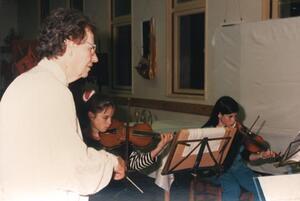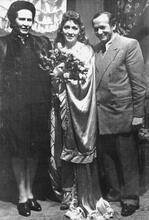Chaya Arbel
Raised as a kibbutznik and taught that music was frivolous, Chaya Arbel only began pursuing a musical career in her forties, but she went on to become one of Israel’s great modern composers. Arbel studied piano in Germany but abandoned it after her family made Aliyah in 1936. She spent the next twenty-five years working the land at Kibbutz ha-Ma’apil, but in the 1960s, the noted piano teacher Ilona Vince Kraus encouraged her to return to music. In 1966 she became founder and director of the Music School of the Menashe region in Ein Shemer. Arbel composed thirty solo and chamber pieces as well as five symphonic works, including 1990’s Dialogue for clarinet and orchestra, for which she won the ACUM Prize.
As a female kibbutznik composer, Chaya Arbel embodied two under-appreciated minorities on the Israeli composition scene. Nonetheless, she managed to overcome social obstacles and emerge, albeit late in life, as one of the country’s few second-generation female composers (born between 1920 and 1940). The first generation included only Verdina Shlonsky as the sole significant woman composer. In the second generation, only Yardena Alotin was acknowledged as the most noteworthy female composer of her time. For Arbel, living in A voluntary collective community, mainly agricultural, in which there is no private wealth and which is responsible for all the needs of its members and their families.kibbutz Ha-Ma’pil since 1936, composition was not a viable option in a Zionist ideological environment that elevated agricultural labor over any bourgeois occupation such as that of classical music teacher or composer. Consequently, after twenty-five years working the land, she pursued serious composition studies only in her forties. She was active in music education for several decades and gained general recognition as a composer in her seventies.
Early and Personal Life
Arbel was born on June 18, 1921, in Nuremberg, Germany and immigrated to Palestine with her parents in 1936. Chaya’s sister, painter Ruth Schloss, whose paintings decorate Arbel’s CDs, still lives in Nuremberg. Another sister, Malka Schmuckler, was born in 1927. Her father, Ludwig Schloss (1889–1957), born in Nuremberg, was a merchant. Her mother, Dina (née Elsass, 1896–1972), born in Ludwigsburg, an infant school teacher in Germany, worked as a farmer in Palestine, while Ludwig became the manager of an agricultural cooperative in Kefar Shemaryahu.
In 1943, Chaya married Shlomo Marcus (1920–1991), a librarian. They divorced in 1946 after the birth of a daughter, Esther, in 1944. In 1952 she married Daniel Arbel, a farmer and librarian, by whom she had three children: Avital (b. 1953), Naomi (b. 1955), and Itai (b. 1961).
Musical Career
It was Ilona Vince Kraus, then a leading piano teacher in Israel, who noticed Arbel’s talent and encouraged her to continue piano studies, which she had begun in Germany but had stopped upon immigrating to Israel. In the 1960s Arbel studied harmony with Mordecai Seter (1916–1994) and in the early 1970s it was her influential teacher Leon Schidlowsky (b. 1936) who encouraged or, more accurately, pushed her to embrace the atonal style. At first, she was reluctant to use what was at the time considered the only option for a serious classical music composer. However, she soon felt that tonal music had nothing new to offer and began writing serial music. Her music has been strongly influenced by the Second Viennese School (especially Berg) and she has used free serial techniques in most of her works. Her pieces of the 1970s and 1980s were more expressionistic and employed some avant-garde idioms; some of the pieces she wrote in the 1990s were more delicate, creating interesting moments in atonal style.
Arbel served as both founder in 1966 and director of the Music School of the Menashe region in Ein Shemer, which in 1990 awarded her a prize for music education achievement. Her list of works consists of thirty pieces for solo instruments and chamber ensembles; she also wrote five symphonic works. Among her recorded pieces are The Writing on the Wall (1979, string orchestra), Fantasy (1983, violin), Lament (1984, orchestra), Remembrance (1985, piano), Dialogue (1990, clarinet and orchestra), Das Tagebuch der Anne Frank (1992), and Sonata (viola, piano, 2002). In 1990 she was awarded the ACUM prize for Dialogue.
Arbel passed away in 2007.





